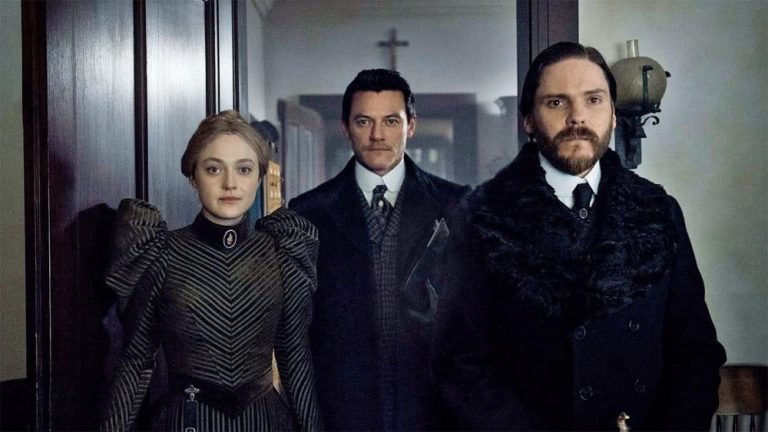Featuring a stellar international cast, The Alienist was written and produced by Cary Fukunaga, Hossein Amini, Eric Roth and author Caleb Carr, whose 1994 novel provides the basis for the series. Granted an eye-watering $5 million budget for each episode, the show takes its time recreating late nineteenth century New York on location in Budapest – but its careful attention to detail hides a rotten plot.
Following the likes of Mindhunter, Hannibal and Broadchurch, The Alienist offers a retelling of how early criminal psychology attempted to prod and poke the minds of serial killers. Surely, given the success other police procedurals have had with the same material, this series should be an easy sell to viewers?
And yet it falls flat. Terribly flat.
The first episode serves – as it should – as an introduction to both the characters and the concept of the series, but disappointingly becomes a plot-by-numbers. As the pilot begins, the murder of a young male sex worker leads police officers to recruit the help of intellectual oddball Laszlo Kreizler (Daniel Brühl), the series’ titular alienist (an archaic term used for some early psychiatrists who believed murderers were being estranged from their true nature).
He’s joined by his straight-as-an-arrow companion and New York Times illustrator John Moore (Luke Evans), who does his bidding unquestioningly, and the police secretary, Sara Howard (Dakota Fanning), who is both a pioneer in her profession, and the only woman in the episode to get multiple lines.
The police consistently resist Kreizler’s methods, yet need him around to solve the crimes (does this narrative sound familiar yet?) Undermining police suspicions, Kreizler deduces that the murder is not the work of an arrested inmate, but of someone with far darker motivations, and he prompts Howard to break the rules and get access to the case files.
Why would she cave into such requests? Because she’s fascinated by Kreizler’s work. Why? It doesn’t matter; the plot simply needs to march on to its plodding, stiff, obvious beat.
The characters’ roles are continuously bashed over our heads with the force of a mallet.
The characters are horrendously thinly sketched. At one point, Kreizler openly tells Moore that he “represents the good”, almost as though the scriptwriters have never before heard the phrase ‘show, don’t tell’, and the characters’ roles are continuously bashed over our heads with the force of a mallet.
Even the seemingly lush attention to period detail, with its cobblestone streets, charming gaslights, and an under-construction Williamsburg Bridge, doesn’t interest or fascinate beyond the superficial. Small details, like the manner by which police alert each other to a crime through face-to-face interaction, or the painful imprints that Howard’s corset leave on her skin, are quite banal. They don’t add to any coherent storytelling or reveal anything about the period that a contemporary audience can relish in.
For all of its spend on budget and location, the scenery appears washed out; its outdoor shots are an impenetrable dark monochrome and indoors are a dirty brown. Early modern hygiene aside, surely there was more colour in the 1890s than the excrement-stained visuals of this episode suggests? And despite their efforts at big budget realism, the outdoor set-pieces look like a trashy backlot poorly masked with visual effects.
It’s possible that because Fukunaga, the director behind True Detective, decided to scale back his involvement with Alienist due to conflicts with another series, that the show’s moral complexity and visual flare went with him. It’s possible too that it may develop throughout the first season into something more promising than what’s offered here, but I have my doubts.
Do we really need another show covering an already exhausted storyline?
So, do we need The Alienist? NBC’s psychological thriller Hannibal has already encouraged audiences to empathise with violent sociopaths and tested viewers’ souls and stomachs with our predilection for extremely grotesque murder cases on the tellie – do we really need another show covering an already exhausted storyline? Kreizler’s remarks, “only if I become [the murderer] … only then will I truly understand” might be revelatory for the 1890s, or maybe even for the nineties, when the story was originally written, but now they induce little more than a groan.
And The Alienist only suffers by comparison to Netflix’s Mindhunter, which undercut our preconceptions of violence and violent men by taking us back to the beginnings of criminal profiling in the 1970s, questioning the divide between the good and bad. Even though that was still well-worn territory, Mindhunters did something new; it took away the certainty that we can pinpoint who a killer is, and gave us answers as to why some murderous people behave the way they do.
Sadly, the potential exists for the The Alienist to do likewise, but on a larger scale: when did modern crime begin? What is the evolution of the serial killer?
But, despite all the promise suggested by its setting and the source material, The Alienist doesn’t seem interested in tackling anything major; anything more than blood and guts. The glorification of violent crime on TV seems to have broadly and thankfully run its course, but the crimes in this episode are dwelled on at length. The show isn’t just satisfied with peppering the audience with descriptions of mutilation: we get Moore’s sketched recreations of the crime scene, with loving and obscene close-ups.
The inspection of a corpse in broad daylight comes not just with sound effects, but with a final slow-motion bird’s-eye dive down toward the body, through a vacant eye socket. And in its ugly luxuriating in horror, the scene brings to mind a line from later in the episode: “Sometimes you can be as subtle as a blowtorch.”
The Alienist will be available to stream on Netflix Australia from Thursday April 19.

































